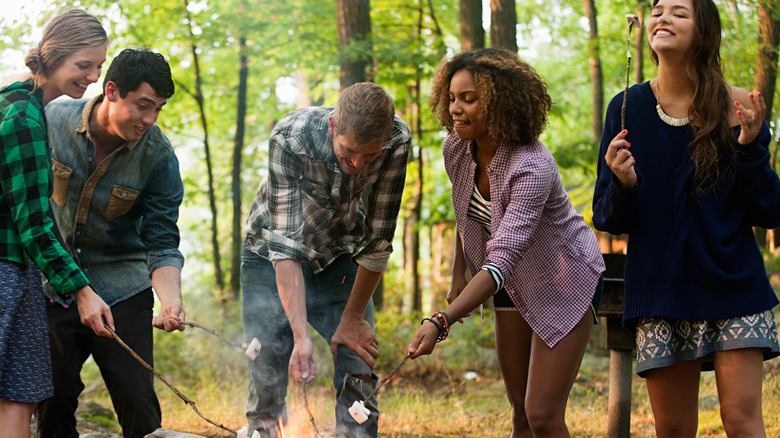Bear attacks happen less frequently than other types of accidents in the outdoors, but that doesn’t mean they don’t happen. And when they do, it can be dangerous and sometimes fatal. With an average of 11 bear attacks annually in the U.S., campers must always be aware of the dangers that may attract these animals to their campsites.
Camping comes with a ton of variables that can cause bears to poke around your campsite, but there are also some common things that you might not realize will attract bears. One of the primary sources for attracting bears is food. According to the National Park Service, bears associate strong smells with food. Bears are equipped with a powerful sense of smell and can sniff food from miles away. A local Seattle news station reported a recent bear attack caused by food scents at a popular campground in North Bend, Washington. Local rangers blamed the campers’ irresponsible behavior with food at the campsite.
Camping, especially in a bear-heavy area, requires a combination of awareness, preparedness, and responsible behavior. By understanding the nuances of bear behavior and addressing the factors that might attract them to campsites, outdoor enthusiasts can enjoy the wilderness without compromising their safety or the safety of these incredible creatures. The goal is not just to protect yourself but also to foster a harmonious coexistence between humans and bears in their natural habitats.
Improper food storage can be deadly
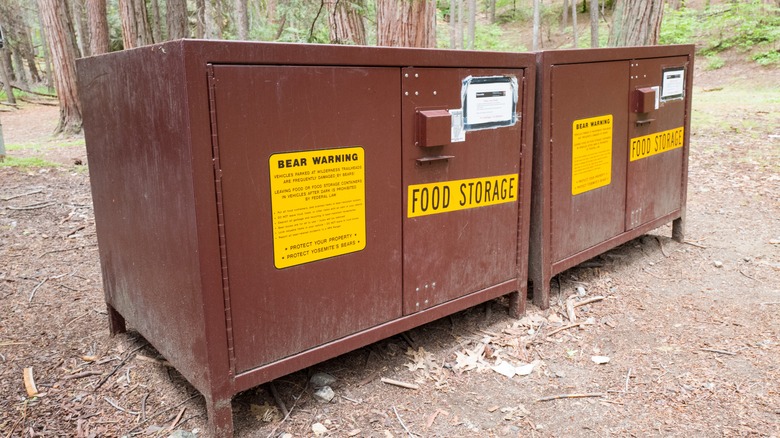
Most already know that bears are attracted to scents, associating them with food, but many campers might not realize the extent to which seemingly innocent odors can lure bears to their campsites. Bears are most active in the early morning hours before sunrise and the late evening hours after sunset. Because campers typically sleep at these times, not making noise, this leaves food odors as the main trigger for a possible bear visit.
One Arizona man was fatally attacked at a campsite this year while sitting with a morning cup of coffee. Completely unprovoked, the bear wandered up to the man and attacked him. Though unclear, it is possible that the bear was attracted to the smell of the coffee. Storing food between uses in airtight containers and never leaving food or scented items out overnight can help prevent unwanted bear encounters like this during the early morning hours.
Bears lose their fear of humans the more they can obtain human food, even scraps and garbage left behind. Once bears become accustomed to human food, they may start associating humans with access to a meal, putting both the bear and human in danger. Instead of leaving food out between meals or when not at camp, pack your food safely by locking it away in a vehicle or storage unit approved by park officials.
Inadequate waste disposal practices
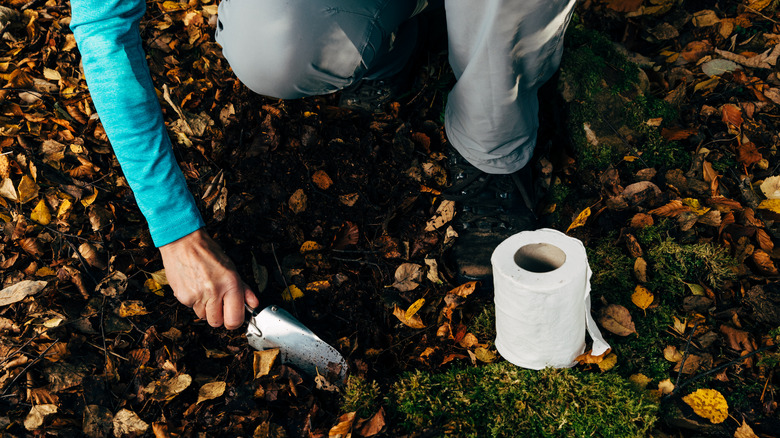
Waste disposal may seem minor, but it can have major consequences when camping. The scent of human (or pet) waste can also attract bears to your campsite. Bears are attracted to the strong and long-lasting scent of urine and feces, so it’s important to properly dispose of waste while camping. This means creating a specific area and means of disposal for you, your pets, and fellow campers.
Bury solid waste in a “cathole” by digging a hole 6 to 8 inches deep and at least 200 feet away from water sources and campsites. After use, the cathole should be covered with soil, and all toilet paper should be packed out in sealed bags. Liquid waste can also be disposed of in this manner or in a designated human waste disposal area provided by park officials.
For longer stays or larger groups, a camping latrine can also be created by digging a larger hole, about the same depth as a cathole but 4 to 6 inches wide and around 12 inches long. It should be the same distance from water sources, as well (200 feet). After use, the latrine should be covered with soil, and a log or flat rock should be placed on top to prevent animals from digging it up. Be sure to clearly mark the latrine with a stick or other noticeable object so that others do not accidentally stumble upon it.
Repelling insects can attract bears
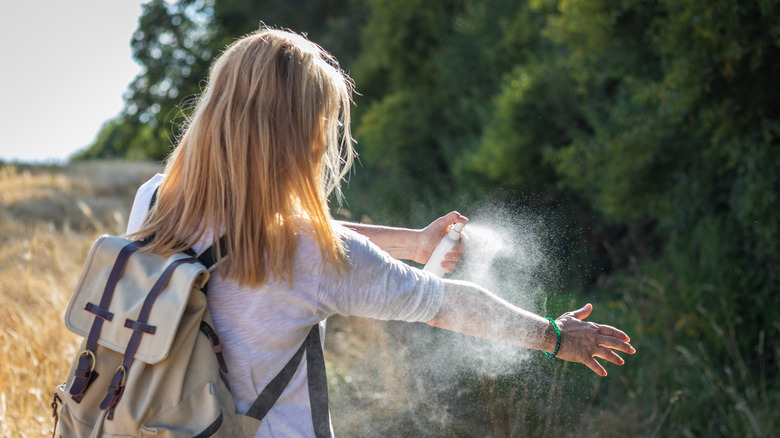
Zbynek Pospisil/Getty Images
Insect repellents can be useful when camping, but it’s important to remember that some repellents may attract bears. Bears are attracted to citronella, a common ingredient in many insect repellents. Citronella has a sweet, citrus smell, similar to that of a ripe fruit, which bears love to eat.
Burning citronella candles to repel mosquitoes may actually invite bears to your campsite. Citronella-based sprays and lotions work well at repelling mosquitoes but should also be avoided when camping. Instead of using citronella-based repellents, opt for alternative options such as DEET or picaridin. Both are effective in repelling insects without attracting bears.
It’s important to carefully read the ingredients of any insect repellents before using them while camping in bear country. Natural alternatives often contain essential oils that may also attract bears. Sweet-smelling oils such as lemon, lemongrass, and eucalyptus may be inviting to bears, too, so it’s best to avoid using them during your camping trip.
Stay on top of camp hygiene
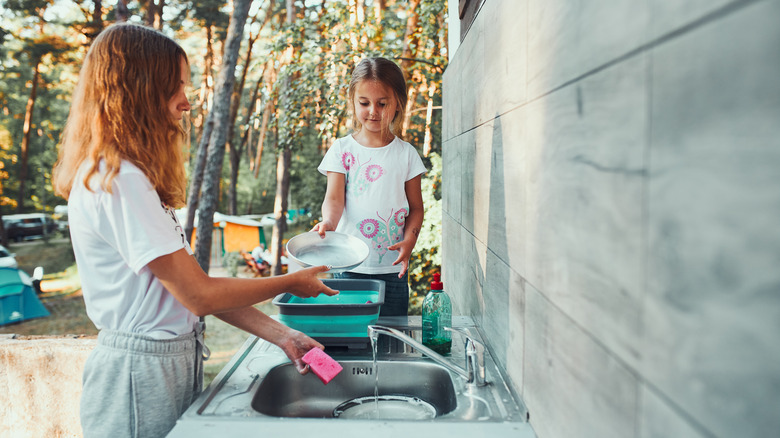
Przemek Klos/Shutterstock
Maintaining proper campsite hygiene goes beyond just securing food and disposing of waste — personal hygiene practices also play a crucial role in bear safety. Campers might not realize that unwashed dishes or dirty clothing can attract bears just as much as the smell of food. Clothing worn while fishing, cooking, or eating should be kept in a separate bag, locked in a vehicle, and not worn in your tent.
Doing a once-over of your campsite when you arrive and before you leave is also important for bear safety. Check the area for any potential food scraps or items that may attract bears, such as trash, coolers, and cooking equipment. Never camp in a site with these items left behind, as it could be prone to bears. If you find food waste, garbage, or other items left behind, look for signs of bear activity (waste, tracks, or scratches on logs or trees). It’s typically best to move to a different campsite and avoid leaving dangerous items behind after you leave.
When it comes to hygiene, a little-known culprit may also attract bears. Greywater, or the water used for washing dishes or personal hygiene, should be disposed of at least 200 feet away from the campsite. Before disposing, you should use a strainer to remove food products from the water. This not only lessens the chances of bears being attracted to the food found in greywater, but also helps prevent contamination of water sources.
Scented toiletries, cleaning products, or perfumes

Odua Images/Shutterstock
The common thread of bears being attracted to strong scents also applies to toiletries and cleaning products. Items like scented soaps, lotions, perfumes/colognes, and toothpaste can all attract bears. It’s best to opt for unscented varieties when camping in bear country, like unscented laundry detergent, and avoid wearing clothes that have been in contact with strong-smelling substances.
Speaking of strong-smelling substances, petroleum products, like gasoline and propane, should also be stored securely away from the campsite. The strong smell of these products can attract bears; and if they happen to spill, they can be harmful to the environment. In fact, any scented items that are not food or drink should be kept in sealed containers and stored away from the campsite.
When it comes to cleaning, bleach and ammonia-based cleaners or pine-scented cleaning products can be good for repelling bears. The strong smell of these products can be overwhelming and help mask any other odors that may attract bears. However, it’s important to properly dispose of these products after use to ensure they don’t harm the environment. Avoid sweet-smelling or fruity-scented cleaning products, as these can actually attract bears.

